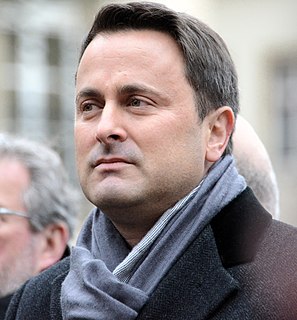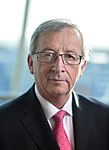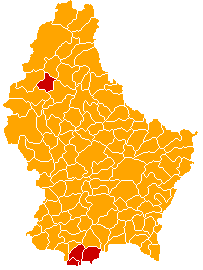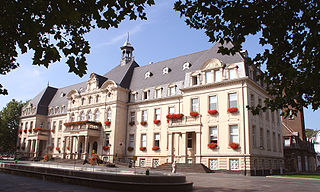The politics of Luxembourg takes place in a framework of a parliamentary representative democratic monarchy, whereby the Prime Minister of Luxembourg is the head of government, and the multi-party system. Executive power is under the constitution of 1868, as amended, exercised by the government, by the Grand Duke and the Council of Government (cabinet), which consists of a prime minister and several other ministers. Usually the prime minister is the leader of the political party or coalition of parties having the most seats in parliament. Legislative power is vested in both the government and parliament. The judiciary is independent of the executive and the legislature.

General elections were held in Luxembourg on 13 June 2004, alongside European Parliament elections. The ruling Christian Social People's Party (CSV) of Prime Minister Jean-Claude Juncker won the election, increasing its number of seats to its highest since before 1989 and its share of the vote to levels not seen since the 1959 election.

Lydie Polfer is a Luxembourgish politician that has served in a number of capacities, including Deputy Prime Minister, Minister for Foreign Affairs, and Mayor of Luxembourg City, as well as a Member of the European Parliament (MEP) and a member of the Chamber of Deputies. She is a member of the Democratic Party (DP).

Nicolas Schmit is a politician in Luxembourg. A member of the Luxembourg Socialist Workers' Party (LSAP), he has been a member of the government since 2004.

Jean Asselborn is a Luxembourgish politician who has served in the government of Luxembourg as Minister for Foreign Affairs since 2004. He also served as Deputy Prime Minister from 2004 to 2013, under Prime Minister Jean-Claude Juncker.

Circonscription Sud is an electoral constituency for Luxembourg's national legislature, the Chamber of Deputies.

General elections were held in Luxembourg on 13 June 1999, alongside European Parliament elections. The Christian Social People's Party remained the largest party, winning 19 of the 60 seats in the Chamber of Deputies. It formed a coalition government with the Democratic Party.

General elections were held in Luxembourg on 12 June 1994, alongside European Parliament elections. The Christian Social People's Party remained the largest party, winning 21 of the 60 seats in the Chamber of Deputies. It continued the coalition government with the Luxembourg Socialist Workers' Party.
The following lists events that happened during 2004 in the Grand Duchy of Luxembourg.

Claude Meisch is a Luxembourgish politician holding (?) a degree in financial mathematics from Trier university. Meisch was appointed Minister of Education in 2013 in the government of Xavier Bettel. He has been a member of the Chamber of Deputies since 1999 and Mayor of Differdange since 2002. He was President of the Democratic Party (DP) from 2004 until 2013, of which he has been a member since 1994.

The first Juncker–Asselborn Ministry was the government of Luxembourg between 31 July 2004 and 23 July 2009. It was led by, and named after, Prime Minister Jean-Claude Juncker and Deputy Prime Minister Jean Asselborn.

Xavier Bettel is a Luxembourgish politician and lawyer, serving as the 22nd Prime Minister of Luxembourg since 4 December 2013 after succeeding Jean-Claude Juncker. He has previously served as Mayor of Luxembourg City, member of the Chamber of Deputies and member of the Luxembourg City communal council. Bettel is a member of the Democratic Party. Following the 2018 Luxembourg general election he became the first openly gay Prime Minister in the world to be re-elected for a second term.

François Bausch is a Luxembourgish politician. He is a member of the Chamber of Deputies and communal council, and an échevin, of Luxembourg City. He is leader of the Greens in the Chamber.

Juncker–Asselborn Ministry II was the government of Luxembourg between 23 July 2009 and 11 July 2013. It was led by, and named after, Prime Minister Jean-Claude Juncker and Deputy Prime Minister Jean Asselborn. It was formed on 23 July 2009, after the 2009 election to the Chamber of Deputies. It fell after the withdrawal of the Luxembourg Socialist Workers' Party from the government; Prime Minister Juncker submitted his resignation to the Grand Duke on 11 July 2013, and a snap election was called.

Early general elections were held in Luxembourg on 20 October 2013. The elections were called after Prime Minister Jean-Claude Juncker, at the time the longest serving head of government in the European Union, announced his resignation over a spy scandal involving the Service de Renseignement de l'Etat (SREL). The review found Juncker deficient in his control over the service.

The First Bettel–Schneider Ministry was the ruling government of Luxembourg from 4 December 2013 to 5 December 2018. It was led by Prime Minister Xavier Bettel and Deputy Prime Minister Étienne Schneider. It was formed on 4 December 2013, after the 2013 election to the Chamber of Deputies. The government wa a traffic light coalition between the Democratic Party (DP), the Luxembourg Socialist Workers' Party (LSAP), and The Greens. It was succeeded by Bettel–Schneider Ministry II in December 2018.
























